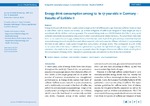Energy drink consumption among 12- to 17-year-olds in Germany –
Results of EsKiMo II
Lehmann, Franziska
Vesela, Katerina
Haftenberger, Marjolein
Lage Barbosa, Clarissa
Mensink, Gert B. M.
Energy drinks are soft drinks that usually contain a large content of caffeine and sugar. Excessive caffeine intake can lead
to side effects such as nausea and anxiety. Up to three milligrams of caffeine per kilogram of body weight per day is
considered safe for children and young people. The second Eating study as a KiGGS Module (EsKiMo II, 2015–2017)
collected nationwide representative data about children’s and adolescents’ dietary behaviour. To collect food intake data
from 12- to 17-year-olds (n=1,353), a dietary history interview was used. 8.9% of the girls and boys stated that they had
consumed energy drinks during the four-week reference period, with nearly a quarter of these individuals (n=99) exceeding
the limit of safe caffeine intake solely through their consumption of energy drinks. This corresponds to 2.2% of the
12- to 17-year-olds in Germany. In addition to a general warning about the high levels of sugar present in sugary drinks,
awareness also needs to be raised among young people about the dangers of excessive caffeine intake resulting from
the consumption of energy drinks. Regulations governing sales and advertising should also be considered.
Dateien zu dieser Publikation
Keine Lizenzangabe

